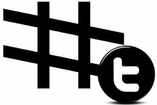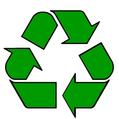
Yes, I'm a writer. But another passion (and day job) of mine recycling. I thought I'd combine the two today to show you how to get the most out of your hashtags on Twitter, and particularly if you're into recycling.
If you're a writer, stay tuned. I'm going to blog a nod to us hard working scribblers very soon, since this blog is, and will remain, centred around creative writing.
I've been very active on Twitter for about 4 months now. One of the best tips I can give new Twitter users is to (relevant) hashtag your tweets until you run out of characters -140 max.
What’s a hashtag?
**Quick shout out and thanks to Andy White for explaining it so clearly to me in the early days**
Hashtags are a method of joining conversations on Twitter. They are words or phrases used in tweets, which have the ‘#’ symbol placed at the beginning of the word. There are no spaces or punctuation in them. When you click on one (normally highlighted in green), Twitter reveals a stream of everyone’s tweets which include that particular hashtag.
An example of this is #pmqs for the BBC’s Prime Minister's Questions. This hashtag quite often trends on Wednesdays due to the weekly TV coverage live from the Houses of Parliament. Searching for #pmqs, you can see all the tweets where people on Twitter (‘Tweeps’) are posting about PMQs. Comments and moaning, jokes and quotes – politics is a popular topic on Twitter.
Ok, I understand that. So, how can I use a hashtag to my advantage?
Hashtags are a great way to learn about subjects you're interested in (e.g. recycling), to get more exposure, build relationships, and therefore increase your own following. As mentioned above, hashtags are a link to a conversation, to be included in tweets that are relevant to a specific topic. So, if you're interested in recycling, you could tweet something short like
Found a place to #recycle my #tetrapak cartons for the first time today - #proud!
This means your post will be visible in the three hashtag conversations of #recycle (talk of all things recycling), #tetrapak (type of rubbish - yes there are hashtags for rubbish!!) and #proud (Tweeps pleased with themselves on a plethora of achievements). All three hashtag streams will feature this tweet. That's exposure for you!
Please note: Hashtags are Twitter limited; they DO NOT work on Facebook, but I have noticed it’s quickly becoming a method of showing emotions, like with emoticons: #smile and #grr are popular. These do not link into the Twitter conversations though.

Let me know in the comments box below if you find any more good ones to add to the list.
#recycling / #recycle / #wasteA complete pair and a good place to start.
#green / #environment / #ecofriendly
Related broader environmental issues.
#litterSelf-explanatory... A good #Twitter account to follow for these kinds of posts is @KeepBritainTidy
#upcycling
If you saw last week's #Apprentice you'd know about this already! Take a look at the new craze in recycling circles.
#plastic / #packaging / #paper ... etc!
For specific waste streams.
#lovefoodhatewasteUK campaign to reduce #food waste and help you #savemoney (space missed deliberately – it’s a popular hashtag).
If you're into all things green, you can also follow accounts like ‘waste reducing guru' Unconsumption @unconsumption, WRAP’s Love Food Hate Waste campaign @wasteawarefood, and the UK Environment Agency @EnvAgency, among many others.
Don't forget to check if your favourite charity (e.g. @UNICEF), local Council (e.g. @RecycleNptshire), grocery store (e.g. @Waitrose), favourite singer (e.g. @official_flo for Flo Rida) etc. has a Twitter page. The world is your limit!
It's really not that hard. Just be polite, interesting and honest. So, what are you waiting for? Get making a change to your world via Twitter and make the most of those recycling themed hashtags!
Oh, and you can follow me on Twitter @MissWriteUK
Lou x

 RSS Feed
RSS Feed
